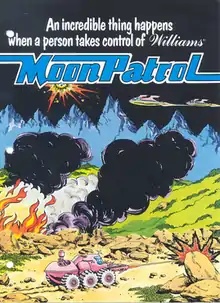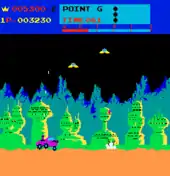Moon Patrol
Moon Patrol (ムーンパトロール, Mūn Patorōru) is an arcade game by Irem released in 1982. It was licensed to Williams for distribution in North America.[1] Moon Patrol is often credited with the introduction of parallax scrolling in side-scrolling video games. Taito's Jungle King side-scroller, released the same year as Moon Patrol, also uses parallax scrolling.
| Moon Patrol | |
|---|---|
 North American arcade flyer | |
| Developer(s) | Irem |
| Publisher(s) | Irem Williams Electronics Atari, Inc. Atarisoft |
| Producer(s) | Scott Tsumura |
| Designer(s) | Takashi Nishiyama |
| Platform(s) | Arcade, Apple II, Atari 2600, Atari 5200, Atari 8-bit, Atari ST, Commodore 64, VIC-20, MSX, IBM PC, TI-99/4A, TRS-80 Color Computer |
| Release | 1982 |
| Genre(s) | Scrolling shooter |
| Mode(s) | 1-2 players alternating |
| Arcade system | Irem M-52 hardware |
Gameplay

The player takes the role of a Luna City police officer assigned to Sector Nine, the home of the "toughest thugs in the galaxy". The player controls a Moon buggy that travels over the Moon's surface, viewing it from the side as it moves towards the right side of the screen. While driving it, obstacles such as craters and mines must be avoided, and various enemies such as UFOs from above and tanks on the ground must be shot down.
Gameplay is within a number of courses, and each is divided into 26 checkpoints, named after the letters of the English alphabet. Of these, the five major checkpoints—E, J, O, T and, Z—denote a new "stage" with a new background and theme; for example, the third stage starting at J introduces mines. The top portion of the screen shows a timeline-style map of the course, with the five major checkpoints clearly marked. Above the map is an indicator of the current checkpoint, the time spent in the stage, and three indicator lights: the top light indicates upcoming enemy aerial attacks, the middle one indicates an upcoming minefield, and the bottom one indicates enemies approaching from behind.
At the end of a stage, that time spent is compared to the average, and bonus points are awarded accordingly, at 1,000 plus 100 per second bettered; completing an entire course gives an additional 5,000 points plus 100 per second bettered. There are two unique courses: the "Beginner Course" and the "Champion Course". The Champion Course "loops" forever, and each loop is numbered for convenience, up to 3.
Extra lives are given at 10,000 points, and per 20,000 scored up to 50,000; thereafter, no more lives are given. Game ends when the last patrol car is destroyed. The game can be continued, but points scored from one game do not carry over. 999,990 points is the maximum high score that can be achieved; players can exceed this score, but the game retains only the last six digits.
Ports
Moon Patrol was ported to the Apple II, Atari 8-bit family, Atari 2600, Atari 5200, Atari ST, Commodore 64,[2] VIC-20, MSX, IBM PC (as a self-booting disk), TI-99/4A, and TRS-80 Color Computer. Many of these were published under Atari's Atarisoft label. Subsequent ports were also published for mobile phones by Bandai Mobile.
Reception
Moon Patrol received a Certificate of Merit in the category of "1984 Best Science Fiction/ Fantasy Video Game" at the 5th annual Arkie Awards.[3]:42 Arcade Express reviewed the arcade version in January 1983 and scored it 8 out of 10.[4]
Scott Mace of InfoWorld stated that Moon Patrol for the Commodore 64 was his favorite Atarisoft game, making good use of the computer's sound.[5]
Legacy
Moon Patrol was included in the retro compilations Arcade Hits: Moon Patrol & Spy Hunter for Game Boy Color and Midway Presents Arcade's Greatest Hits: The Midway Collection 2 for Dreamcast, PlayStation, and Windows. In 2006 Bandai released an enhanced version as Moon Patrol EX for cell phones.[6] On March 22, 2018, Moon Patrol was released for the Nintendo Switch by Hamster as part of the Arcade Archives series.[7] A version subtitled The Milky Way Chronicles was announced in 2018 for the Intellivision Amico.[8]
Clones
A bootleg version called Moon Ranger was released in the arcades the same year as Moon Patrol.[9]
Home clones include Desert Patrol for the TRS-80 Color Computer (1983),[10] Gas Hog for the Atari 2600 (1983),[11] Lunar Rover Patrol for the Dragon 32 (1983), Moon Buggy for the Commodore 64 (1983), Moon Alert for the ZX Spectrum (1984), Luna Rover for the ZX Spectrum (1985),[12] Moon Control for the Amstrad CPC (1985), Moonrider for MSX (1986), and Overlander for the Amiga (1993). Battle Through Time (1984) for the Commodore 64 re-themed the gameplay to be about major wars of the 20th century.
Open-source clones named moon-buggy [13] and ASCII Patrol [14] run in Unix-like terminals.
References
- "Moon Patrol - Videogame by Irem". Arcade-museum.com. Retrieved 2015-02-19.
- "Moon Patrol - Commodore 64 Game / C64 Games, C64 reviews, downloads & SID tunes". Lemon64.com. Retrieved 2015-02-19.
- Kunkel, Bill; Katz, Arnie (January 1984). "Arcade Alley: The Arcade Awards, Part 1". Video. Reese Communications. 7 (10): 40–42. ISSN 0147-8907.
- http://www.digitpress.com/library/newsletters/arcadeexpress/arcade_express_v1n11.pdf#page=6
- Mace, Scott (1984-04-09). "Atarisoft vs. Commodore". InfoWorld. p. 50. Retrieved 4 February 2015.
- Buchanan, Levi (June 29, 2006). "Moon Patrol EX". IGN.
- "Arcade Archives: Moon Patrol".
- "INTELLIVISION® CELEBRATES ITS 40TH ANNIVERSARY". Intellivision Entertainment. October 22, 2018.
- "Moon Ranger - Videogame by Unknown". Klov.com. Retrieved 2015-02-19.
- "Desert Patrol - 1983 - TRS-80 Color Computer Game". YouTube.
- Trionfo, Adam; Federico, Chris. "Gas Hog". Orphaned Computers & Game Systems.
- "Luna Rover". World of Spectrum.
- "moon-buggy". Games on the Linux console.
- "Ascii Patrol". Homepage.
External links
- Moon Patrol at the Killer List of Videogames
- Moon Patrol at the Arcade History database
